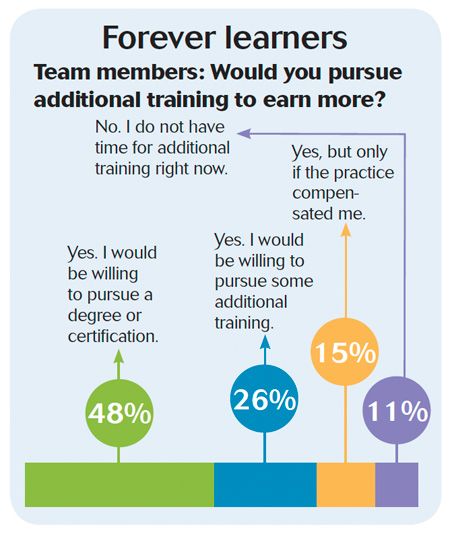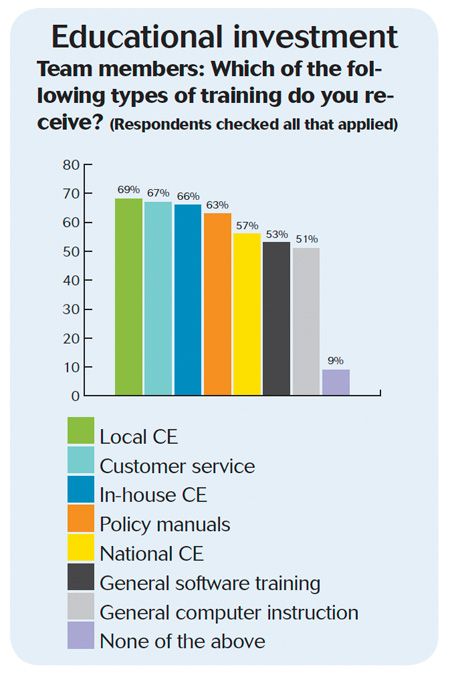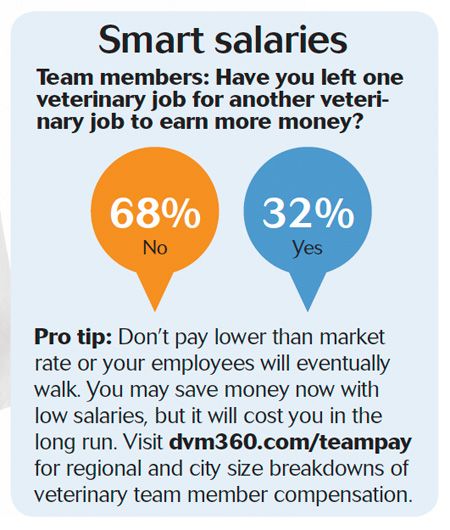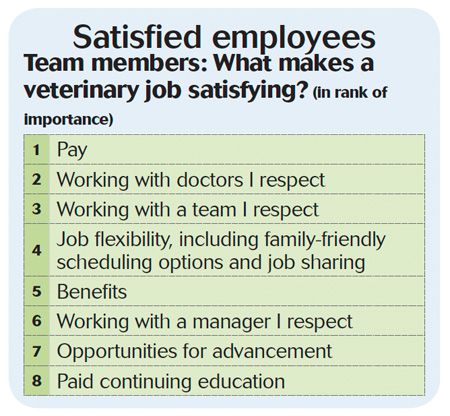10 revenue-boosting tactics to pay staff more
If your team members deserve better compensationand if you want to keep the best of the best, they doyou need to boost your revenue. Heres how to make it happen. Plus, data from 2015 Firstline Career Path Study.

Photo: GETTYIMAGES/Aleksander KaczmarekYou know the old saying about how you can't love someone until you love yourself? I say your clients won't love you unless you love your team. One great way to show your love is excellent compensation and opportunities for advancement. Here are my 10 ways to boost revenue to pay staff more, along with links to resources at dvm360.com hand-picked by the Veterinary Economics editors to help you make that happen:
(All data from the 2015 Firstline Career Path Study)
1. Expand team members' responsibilities and roles
Veterinarians need to expand the roles and services their staff provides in order to support higher wages. We all understand this: A team member performing class IV laser therapy is paid more than someone cleaning cages.

2. Expand services
Practices need to add services to generate more revenue and increase wages. Nutritional counseling and behavioral training are good examples. Don't let veterinary imposters claim these sectors and reap the financial rewards
3. Expand staff training
Employees can produce more revenue if they know their jobs better and perform them more efficiently. Almost 20 years after instituting weekly staff training, I still believe it's the best investment a practice can make.

4. Expand pet insurance
Third-party payment systems are increasingly necessary to improve clinic cash flow and support raising fees. Veterinarians need to embrace pet insurance by learning what it is and isn't. (It isn't an HMO and they don't set veterinary fees.) Choose a provider you value and trust (start with the comparison chart at dvm360.com/insurancechart) and actively promote them to clients. 2015 is the year to get on board.
5. Analyze practice finances
Is your practice profitable? (Find out at dvm360.com/profitable.) Too many clinic owners review their finances once or twice a year-far too infrequently to make meaningful strategic changes. You can't pay your staff or yourself more if you don't understand the basics of small business economics. Pledge to learn how to analyze your practice's finances this year and begin reviewing your data monthly. Financial knowledge is essential to earning more money.

6. Evaluate debt
Interest rates are set to rise in 2015. It's time to examine your practice debt to see if you can negotiate lower rates or fees (sharpen your skills at dvm360.com/negotiate). Any earnings can be applied toward increasing staff wages and benefits or infrastructure improvements.
7. Canvass the competition
Who, what and where are your competitors? Think beyond competing veterinary clinics and evaluate threats from retailers, noncredentialed service providers and online companies. Know your “enemy.”

8. Find out what clients want and give it to them
Happy clients recommend your services and spend more, so find out what they want. Conduct surveys and make post-appointment phone calls (get tips at dvm360.com/surveytips). Then hire a mystery shopping service or ask a friend to call or come in for an appointment to give you the low-down on your client service (see how other practices survived the test at dvm360.com/surviveshopper).
9. Say “yippee!” for Yelp!
Embrace online reviews-they're not going away. Don't be afraid to ask clients to recommend you online (more at dvm360.com/awkward). Be subtle, but make it easy by including links in electronic correspondence and welcome brochures. Develop a response strategy to less-than-stellar reviews and tactics for monitoring review sites (get ideas at dvm360.com/onlinerep). Review sites are today's word-of-mouth generators.
10. Love your team
Happy teams are more productive, and people are happiest when they feel respected and appreciated, have challenging job responsibilities and feel like part of a bigger mission or cause. Take time each day to thank your employees for their hard work (pointers at dvm360.com/saythanks). It's both self-centered and demoralizing to walk around the practice every day telling yourself and others, “I shouldn't have to go around thanking everyone for doing what they should be doing.” A pat on the back goes a long way toward producing more revenue. The best teams are appreciated emotionally in addition to receiving a generous wage.

Veterinary Economics Editorial Advisory Board Member Dr. Ernie Ward is an author, speaker and the founder of Seaside Animal Care in Calabash, North Carolina. Heather Lewis, AIA; Andy Rollo, DVM; and Craig Woloshyn, DVM, helped with this article.